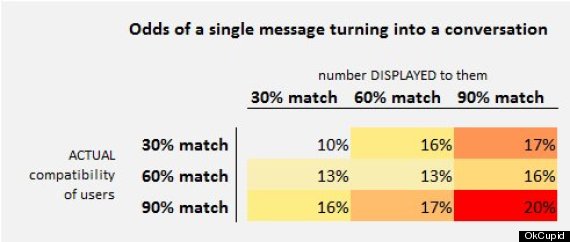Remember last month when everyone hated on Facebook for manipulating people's moods in the name of science? On Monday, the dating website OkCupid came to Facebook's defense by admitting that it, too, runs experiments on people.
Let's just say the reaction wasn't much better.
Christian Rudder, one of OkCupid's founders, wrote a company blog post Mondayexplaining that he and his engineers sometimes play around with people's accounts to figure out the best way to build the site. In the past, Rudder wrote, that tweaking has included hiding profile text and telling pairs of people who might have made great matches that they weren't actually good for each other.
Despite the breezy tone of Rudder's post, lots of people weren't very happy.
"We noticed recently that people didn't like it when Facebook 'experimented' with their news feed," Rudder wrote. "Even the FTC is getting involved. But guess what, everybody: if you use the Internet, you're the subject of hundreds of experiments at any given time, on every site. That's how websites work."
Anyone who thinks looks shouldn't matter is likely to be bummed out by the company's findings. Back in the days when OkCupid would ask users to rate potential dates on both looks and personality, Rudder's team decided to hide text in some profiles -- the life summaries that the lovelorn toil over for hours -- just to see what would happen. They found that people received about the same personality score with or without text. Conclusion: Rating personality was just another way of asking "Is this person cute?"
Another experiment tested OkCupid's famous matching algorithm, which is supposed tell you, on a scale of 0 to 100, how good a match you are with someone else. The site told some pairs who were bad matches that they were, in fact, great for each other, and it told other pairs who had scored high on compatibility that they weren't a good fit. OkCupid found that the power of suggestion made people who were incompatible -- according to the algorithm, at least -- hold an online conversation longer than expected.

The argument that Rudder is making on behalf of the rest of the tech industry is that websites need to do this sort of testing to build stuff we like. "Most ideas are bad," he wrote. "Even good ideas could be better. Experiments are how you sort all this out."
In June, Facebook published a bit of research that cast some light on its manipulative practices. In a university-approved experiment, the site tweaked some people's news feeds to figure out what would put them in a bad mood. The paper provoked a national conversation over the secret testing all large websites presumably do.
It's not exactly a surprise to learn that OkCupid's data people like to play around with user metrics. In fact, for years OkCupid has synthesized chunks of its data to publish fun, viral blog posts like 2011's "10 Charts About Sex."
Still, it's one thing to look at a bunch of anonymized data and draw conclusions from it, like OkCupid did when it told us the real stuff people white people like. It feels like something else entirely when a dating site that sells itself on the power of its matching algorithm lies to some of its users about that very thing.

No comments:
Post a Comment